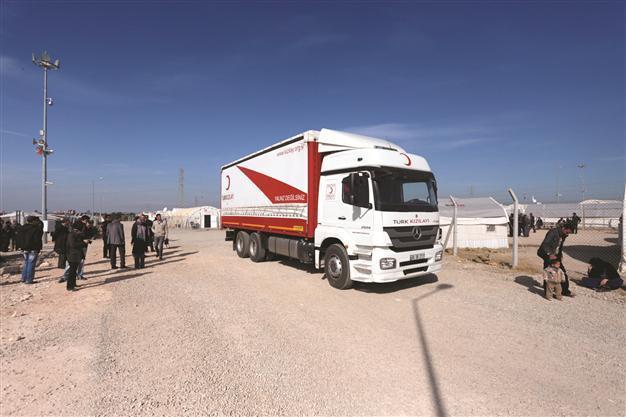Top state body presents bitter criticism about Kızılay, Yeşilay
ANKARA

A truck of the Turkish Red Crescent (Kızılay) delivers humanitarian aid to Syria in this file photo. Gül authorized DDK to audit Kızılay and Yeşilay. AA photo
Reports drafted by a top state body upon an order by President Abdullah Gül have exposed grave flaws regarding the performance and functionality of both the Turkish Red Crescent Society (Kızılay) and the Green Crescent Society (Yeşilay).Gül authorized Turkey’s State Audit Board (DDK), working under the presidency, to audit Kızılay and Yeşilay, as well as the Undersecretary for Defense Industries (SSM), in November 2012. The order included the inspection and evaluation of the sufficiency of internal control systems.
Sources told the Hürriyet Daily News at the time that Gül used his constitutional authority to inspect institutions that the public is concerned do not have transparent internal auditing mechanisms.
The reports were eventually posted on the official website of the Presidency of the Republic of Turkey on Feb. 12. The report on Kızılay particularly covered its activities and operations in 2010, 2011 and 2012, while the report on Yeşilay remarkably highlighted the misguidedness of approaching addiction as a “matter of lifestyle.”
“When all activities of the Turkish Kızılay Association are looked at as a whole, serious disorganization and ambivalence is seen in the fundamental goals and targets of its assistance activities. Kızılay has come to a situation where it wants to be present in almost all assistance activities and fields, instead of being a civil society organization that makes contributions in certain fields of assistance,” said the DDK report.
It added that Kızılay has focused on creating income via the founding of economic enterprises and through practices and activities that are aimed at increasing its capacity to collect donations.
“These activities have become perceived as fundamental goals and functions, but have accelerated and strengthened the loss of focus in its main functions,” the DDK maintained.
Although Kızılay has 735 branches in the entire country, a majority of these are branches only have “doorplates” of Kızılay and no income.
“It has been seen that companies that are founded by Kızılay, or in which Kızılay is a partner, have not been able to be administrated in line with its foundational goals and expectations; that the companies it partially or entirely owns could only transfer 55,799 Turkish Liras as a share of profits to the headquarters’ accounts from 2006 to 2012; that it declared a 1,352,890 lira loss in the same period; that this situation has increased Kızılay’s financial and administrative burden; that the Kızılay Directorate General cannot reach actual data about the companies when it is wanted; and that Kızılay is not effective in company administration and auditing,” the report said.
The DDK also said the fact that legal and administrative operations of those companies are fulfilled by Kızılay staff increases Kızılay’s financial and administrative burden, instead of providing it with financial income.
‘Addiction not a matter of lifestyle’
In the report concerning Yeşilay, meanwhile, the state body said the public authorities had embraced a “monopolistic approach” in the struggle against addiction because it is unwilling to regard the private sector and civil society as solution partners.
The report drew attention to the drawbacks of “handling drugs that are subject to addiction, usage and manners, with a view based on censorship, instead of regarding addiction as a problem and improving the method of the struggle.” It also criticized “approaches based on lifestyle arguments.”
Such approaches prevent the forming of an appropriate and joint ground for selecting goals and tools for the struggle and for the social approaches about this struggle, the DDK maintained.
“It is understood that activities concerning the struggle against addiction in Turkey are more focused on prevention, such as arrangements that introduce bans and the implementation of laws. This situation also leads to the rising of a perception that addiction has been reduced to a public order and health problem by the public [authorities],” the DDK warned.
The top state body urged officials to draft a “National Policy and Strategy Document in the Struggle Against Addiction,” which would be comprehensive with regard to the kinds of addiction covered.
















